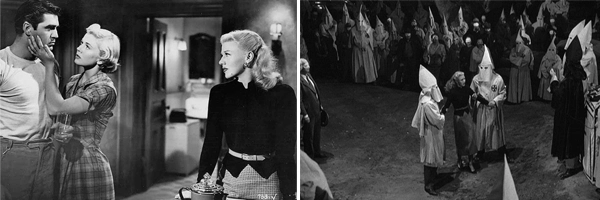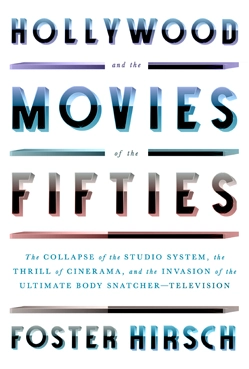
Joan Crawford in the 50s
In Sudden Fear, Crawford at forty-six plays a woman whose husband wants to kill her; the indignity is compounded in Torch Song in which her character ignites passion in a blind pianist (Michael Wilding). Designed as a showcase for an aging star to prove herself, Torch Song instead exposes Crawford’s icy calculation. The split in Jenny between tough-as-nais and vulnerable is highlighted in a notorious musical number, “Two Faded Woman,” by Arthur Schwartz and Howard Dietz, in which (and it’s a shocker) Crawford appears in blackface surrounded by male and female dancers also in blackface. the thick painted lips of her blackface mask are a cartoonish version of her own lipstick smear. When she removes a black wig at the end of the number, her hair is dyed an intense artificial red, a painful complement to her radioactive-blue dress. (“…And for the first time you’ll see her in Technicolor,” ads announced.) One of the last examples of blackface in a mainstream Hollywood film, “Two Faced Woman” is beyond clueless even for its time.
The foolish Torch Song hurt her, but Crawford was by no means down and out. Between 1954 and 1959 she made six films. While Torch Song is a semiforgotten freak show, her next film, the equally strange Johnny Guitar (1954), is a baroque western with a large and ever-expanding cult following. During production Crawford was unhappy; she didn’t get along with or understand her famously tongue-tied young director, Nicholas Ray, but more than that she felt she was slumming because the movie was made at Republic, one step up from Poverty Row. “There is no excuse for making a picture this bad,” she announced after the film was released. Ironically, however, Johnny Guitar is one of Crawford’s most revived and admired works. But the film’s high reputation has little or nothing to do with Crawford herself, where she is the only raison d’etre for Torch Song, and the film’s failure is indivisible from her own.

In Johnny Guitar (Philip Yordan, Ben Maddow, and Nicholas Ray devised the quirky story), Crawford plays Vienna, a shrewd businesswoman who runs a saloon outside of town. “She is just like a man,” observes a character at a gambling table as Vienna makes her star entrance on a balcony at the top of the stairs. Wearing a pistol on her side and dressed in severe black accented by a green kerchief, Crawford does indeed look the apotheosis of the phallic woman—masculinized, for sure, and looking far more severe than she had only two years earlier in Sudden Fear.
The rest of the film without complete success, tries to recuperate her as a full-fledged woman infatuated with the title character (played by Sterling Hayden), a gunfighter. Strange name, Guitar: a guitar has a feminine shape, decidedly not phallic, and is of a piece with the feminized or infantile-sounding names of the other leading male characters, Turkey (Ben Cooper) and the Dancin’ Kid (Scott Brady). The Dancin’ Kid “loves” Turkey, a man-child, and is distraught when he is killed in a shootout; Turkey “loves” Vienna, who needs Johnny Guitar to “complete” her as a woman. The primary romance, however, is between two women , Vienna and Emma Small (Mercedes McCambridge), whose family owns the local bank and who speciously accuses Vienna of holding it up. Emma Small (small indeed) forms a posse to burn down Vienna’s saloon and to hang its owner.

While Johnny Guitar is an allegory of the witch-hunt mentality of American in the 1950s—far more provocatively the film is also about a love that could not speak its name. Despite its misleading title, Johnny Guitar is about an undeclared, unacknowledged relationship between two masculinized women vying for control of men and of a community. Part of the continuing allure of this gargoyle of a movie is in what it cannot confront, the “unnatural” attraction of Emma for her archrival, Emma’s fanatical, deranged hatred for Vienna certainly resembles that of a spurned lover, and because it cannot be declared, the character’s fury is intensified. Riding to Vienna’s leading a posse, Emma in severe black looks as if she is wearing a nun’s habit, and when, emitting a laugh stained with sexual perversity, she sets fire to Vienna’s saloon, igniting a holocaust, she seems like a sadist come to claim her victim. Furious with Vienna for not returning her unspoken desire and with the Dancin’ Kid for making her “feel like a woman,” Emma is one twisted sister.
Too shrewd not to realize that Mercedes McCambridge (who plays Emma with feral intensity) had the better role by far, Crawford for the only time during the decade is oddly disengaged. Her delivery is slow to the point of being lugubrious. Apart from Crawford, however, Johnny Guitar is an overstuffed allegory about witch hunts and sexual repression, and an essential 1950s oddity. This giddy, gnarled western is a treasured example of Hollywood-style cinema maudit.

A bizarre film noir starring Ginger Rogers and Doris Day
In the Warner Bros. crime-movie category, the decade’s hands-down winner is Storm Warning (1951), a forceful and unexpected exposé delivered in the hard- hitting house style that had reached its apex during the Depression in such films as I Am a Fugitive from a Chain Gang (1932). READ MORE
